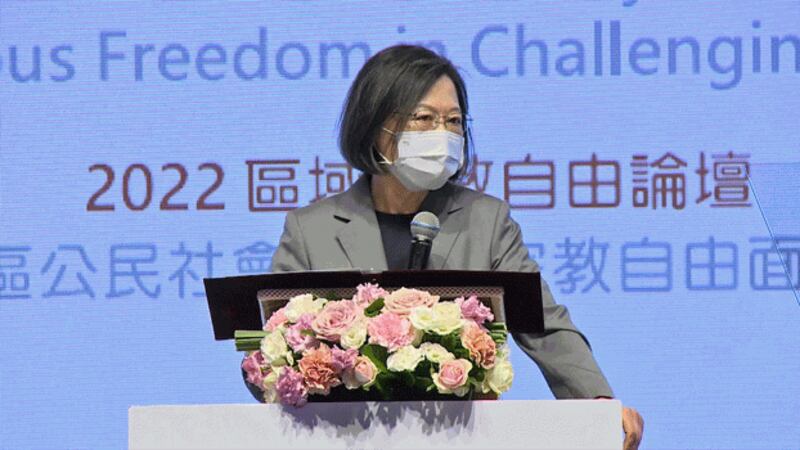The head of a U.S. agency that monitors religious freedom around the world warned Tuesday that Taiwanese may face a similar fate to the persecuted Uyghurs in western China’s Xinjiang region if Beijing invades the democratic island nation.
“The communist authorities have made it clear that Taiwan must understand what’s happening to the Uyghur people,” Nury Turkel, the chairman of the United States Commission on International Religious Freedom, said during his keynote address at the opening ceremony of the two-day Regional Religious Freedom Forum in Taiwan’s capital Taipei.
“You must know that if you fail to protect Taiwan, a similar fate awaits for the Taiwanese people,” Turkel said. “Of course, there can be no doubt that there’s no situation that illustrates the Chinese regime’s intentions for Taiwan and for the world than the ongoing genocide and crimes against humanity that are being carried out by the Chinese Communist Party [CCP].”
The event is being co-hosted by the Taiwan Ministry of Foreign Affairs, the American Institute in Taiwan and the Taiwan Foundation for Democracy. Attendees included members of the Taiwanese government and members of the foreign diplomatic corps in Taiwan.
It is believed that Chinese authorities in Xinjiang have arbitrarily held up to 1.8 million Uyghurs and other Turkic minorities in people in a vast network of “re-education” camps and in prisons. China has claimed the facilities were “vocational training centers” meant to prevent religious extremism and radicalism and later said they had been closed.
There is also ample evidence that some detainees were subjected to forced labor, torture, sexual assault, and forced sterilizations and abortions, though Beijing has vehemently denied accusations of rights abuse. The U.S. government and several Western parliaments have declared that the actions amount to genocide or crimes against humanity.
“We have seen what the CCP is doing to the Uyghur people,” said Turkel, who is a Uyghur-American attorney and human rights advocate based in Washington, D.C. “We know what the Chinese regime is doing to the people of Hong Kong and what they are willing to do to their own people in Shanghai in the name of a political goal. And we can be certain that the Chinese leaders pursue the same for Taiwan.
“Taiwan must study the Uyghur genocide,” Turkel said. “You must learn from these horrors and atrocities carried out in broad daylight. You must not wait and see, hope for the best, or hope that you will be spared from the same fate.”
Turkel told RFA that he urged the Taiwanese government to join like-minded liberal democracies in the effort to enforce bans on goods made by Uyghurs under forced labor restrictions in China.
The 2022 Regional Religious Freedom Forum is focusing on challenges to religious rights amid growing authoritarianism in the Indo-Pacific region and the role that NGOs and civil society can play in defending and expanding protections to worship.

Model of inclusiveness
Other speakers included Taiwanese President Tsai Ing-wen; You Si-kun, speaker of Taiwan’s parliament and chairman of the Taiwan Foundation for Democracy; and Sandra Oudkirk, director of the American Institute in Taiwan. Rashad Hussain, U.S. ambassador-at-large for international religious freedom, gave remarks in a prerecorded video address.
Taiwan aims to provide a model of inclusiveness for the broader Indo-Pacific region, given its work to protect and advance religious freedom on the island, Tsai said, adding that the island was recently recognized as an inclusive destination for Muslim travelers.
But Tsai also cautioned about oppressive regimes in the region cracking down on religious freedom.
“Religious freedom is a universal human right,” Tsai said at the forum. “But in recent years, we have seen authoritarian regimes repress this fundamental freedom on an ever-greater scale.
“Taiwan knows what it means to stand on the front lines of authoritarian aggression, and we are deeply committed to advancing religious freedom at home and abroad, including by supporting those who cannot exercise that fundamental right,” she said.
Speaking to RFA Uyghur in an exclusive interview, Turkel welcomed Tsai’s support for Uyghurs and other groups who have faced religious persecution and human rights violations.
“Taiwanese officials expressed deep concerns about the ongoing Uyghur genocide and showed solidarity with the Uyghur people who have been subjected to collective punishment, mass internment, enslavement, enforced family separation, and sexual violence against the Uyghur women,” he said.
Turkel’s visit to Taipei comes nearly four weeks after a two-day visit to the island by House Speaker Nancy Pelosi as part of a tour of countries in the Indo-Pacific region.
Pelosi’s visit to Taiwan made her the highest-ranking U.S. official to visit the democratically governed island in 25 years, angering Beijing, which considers the island of 23 million people roughly 100 miles from the Chinese mainland as an inherent part of China.
Beijing conducted a series of military exercises in the waters surrounding the island in response to the visit, which Chinese leaders considered a breach of the U.S.’s one-China policy.
Written in English by Roseanne Gerin.
